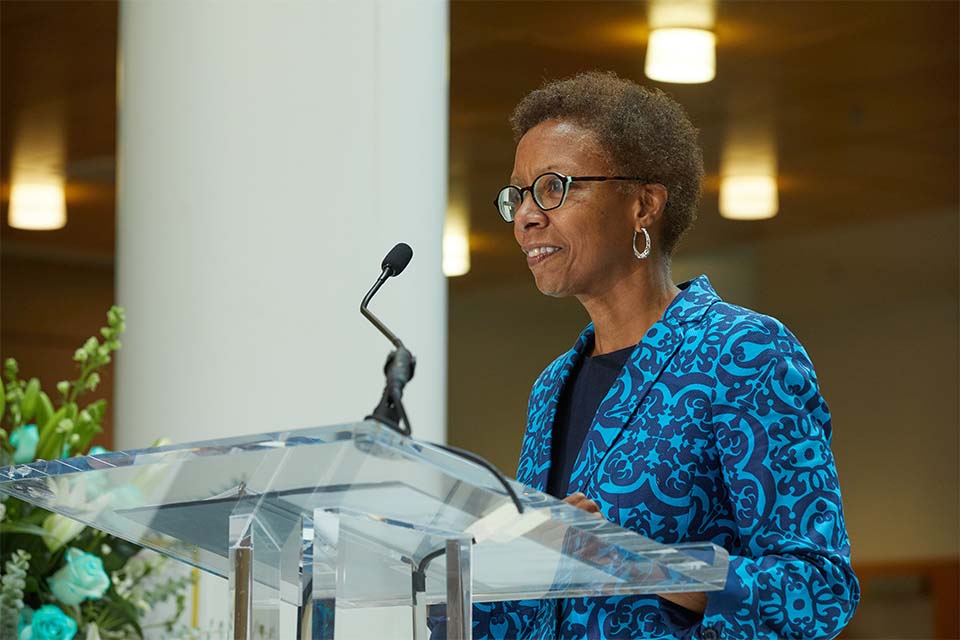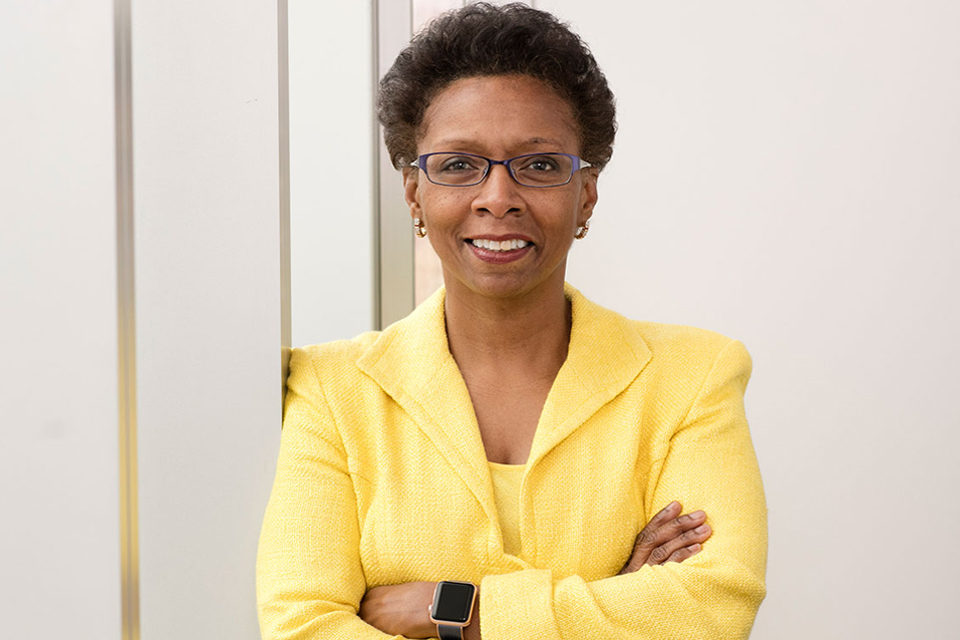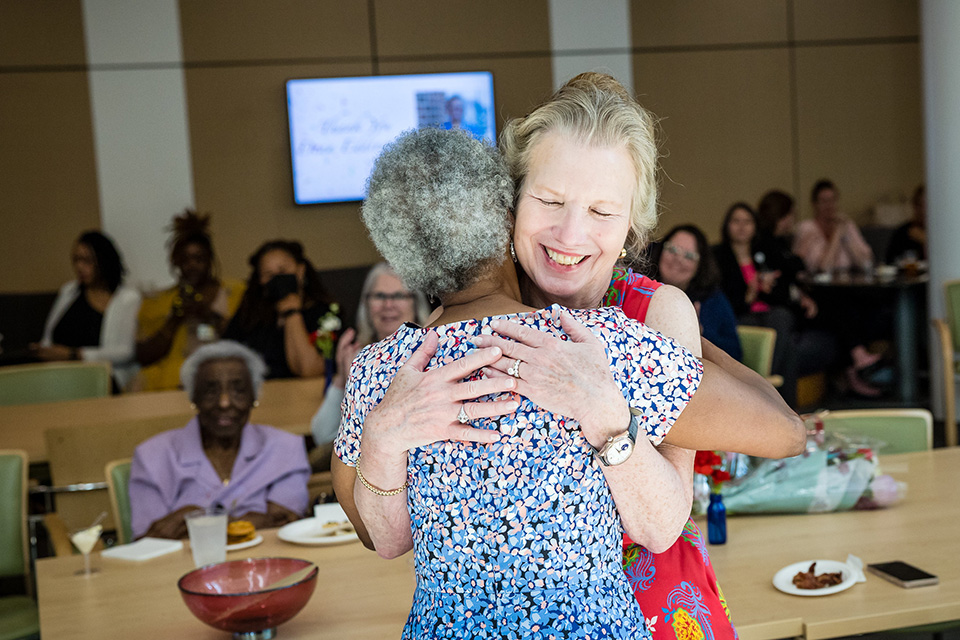Recognizing an Academic Leader
When Natalie D. Eddington stepped down as dean this spring, it marked the end of a more than 15-year tenure spent in service to academic pharmacy filled with laudable accomplishments.

By Christianna McCausland
September 25, 2023
Nearly 16 years ago, Natalie D. Eddington was annoyed. At the time, former University of Maryland, Baltimore (UMB) President David J. Ramsay, DM, DPhil, was looking for a new dean for the School of Pharmacy. Eddington, who earned her PhD from the School in 1989, the first female African American to do so, had returned to her alma mater in 1991 to join the faculty in the Department of Pharmaceutical Sciences (PSC) after two years at Pfizer. Having risen to department chair of PSC in 2003, Eddington wanted to be on the committee selecting the next dean and could not understand why the president hadn’t accepted her request to join. She went to give him a piece of her mind, and he delivered a piece of news.
“He said, ‘I want you to throw your hat in the ring,’” she recalls. “That’s how this started. It wasn’t that I aspired to be a dean. But when someone you admire sees something in you, I think you need to find out what that is.”
When Eddington emerged as the best candidate after a national search in August 2007, she became UMB’s first female African American dean. When she stepped down at the end of May 2023, it ended her time as the current longest-serving dean at UMB. During her tenure, she navigated the School of Pharmacy through challenging times including an economic recession, a global pandemic, and a downward national trend in pharmacy school enrollment.
Yet the School is stronger than ever, currently ranked 14th out of more than 140 schools of pharmacy by U.S. News & World Report. Within her first five years, Eddington oversaw a major revision of the Doctor of Pharmacy (PharmD) curriculum and the expansion of the PharmD program to the Universities at Shady Grove (USG), opened the seven-story, $62 million Pharmacy Hall Addition, expanded research efforts, and built bridges among peer academic institutions, federal agencies, and local and national legislators.
“She’s an exemplary dean who understands her priority is to be an advocate for her school,” says Jay A. Perman, MD, chancellor of the University System of Maryland and former president of UMB.
E. Albert Reece, MD, PhD, MBA, former executive vice president of UMB, former dean of the University of Maryland School of Medicine, and currently an endowed professor and director of the medical school’s Center for Advanced Research Training and Innovation, was chair of the search committee when Eddington was under consideration.
“It didn’t take long to realize she was the right person,” he recalls. Reece says she was personable, humble and had good insights, but he appreciated her as a scientist. Over the years, the two schools have had many successful collaborations, particularly in the area of drug development.
“The medical school is research intensive, and Natalie is a researcher, and so it made sense that if medicine and pharmacy were going to forge a close relationship, having the dean as a researcher herself would enhance the relationship that already existed between the two schools,” says Reece, a fellow researcher. In fact, extramural funding at the School of Pharmacy nearly quadrupled during Eddington’s time as dean to more than $25.9 million and 50 funded faculty by September 2022, resulting in a national ninth-place ranking by the American Association of Colleges of Pharmacy (AACP). Including contracted and clinical services, the School generated a total of $38.5 million in 2022.
Before she could grow any of her programmatic plans, one of Eddington’s first efforts as dean was to strongly advocate for the Maryland General Assembly to allocate funding for the building of Pharmacy Hall Addition. Ellen H. Yankellow, BSP ’73, PharmD ’96, president and CEO of Correct Rx Pharmacy Services, says that while people take the building for granted today, it took a years-long advocacy effort to bring it to construction. “It was an important step for the School of Pharmacy and catapulted it forward, making a better environment for training pharmacists and researchers and creating new academic programs.”
Yankellow attended the ribbon-cutting for the new building in 2010. Eddington’s commitment to seeing the new building opened impressed Yankellow. “I was very proud to be with her that day when the 128,000-square-foot building was dedicated,” she says.
“The fact that she was a woman — unusual at the time — was not lost on me,” Yankellow continues. “It was nice to see a woman nationally recognized as a thought leader, and she set the bar high for other women in pharmacy and science to follow. She really showed there are no limits for what women can achieve, both in academia and in our profession.”
A hallmark of Eddington’s time as dean was her desire to move the pharmacist from the traditional, behind-the-counter dispensing role to one of greater prominence and impact, often through innovative programs. Bruce E. Jarrell, MD, FACS, current president of UMB, has worked with Eddington on a number of academic programs, most notably new master’s programs at USG. “She’s very facts-driven,” says Jarrell, “She’s always the one to say, ‘Show me the data and then let’s figure out where we’re going to go.’”
At Shady Grove, the time was right in the mid-2000s for the School of Pharmacy to explore innovative modes of delivery to engage prospective pharmacy students. So, in fall 2007, the School opened its program at USG, with an additional 40 students per year based there, complementing the 120 students per year in Baltimore. The expansion to USG also saw the implementation of online academic delivery, revolutionary for its time and a format that would prove prescient years later when COVID-19 caused schools to pivot to virtual learning.
“Shady Grove helped us understand you don’t need to be in the same room to learn,” says Eddington. “One thing about higher education is that it’s important that faculty and students not get complacent. Everything we do needs to focus on learning. Shady Grove helped us change the way we looked at pharmacy education.”
Jarrell notes that while Eddington is data-driven, she also has a strong intuition. “The School had a very strong program at Shady Grove, but as the tea leaves became clear to [Eddington] and she foresaw lower enrollment, we were able to downsize that program together.”
Fluctuations in national pharmacy school enrollment have marked all of Eddington’s years at the School. Her ability to be nimble and responsive enabled the School to retain students while other institutions struggled. “The challenge is that there was an increase in the number of schools of pharmacy that was not in tune with the needs of the workforce,” says Perman. “Natalie saw that coming and made adjustments in capacity. She’s very good at anticipating workforce needs.
“I admire her for what she’s put into place,” Perman continues. “She put centers into place like the Bio- and Nano-technology Center and the Mass Spectrometry Center; wherever I go around the country I always talk about the PATIENTS Program set up under her leadership, which is a model of engaging a community that often feels it’s the subject of research and is now a partner in the research.”
While other schools doubled down on their PharmD programs, Eddington innovated by starting new master’s-level programs, most notably the nation’s first-ever Master of Science (MS) in Medical Cannabis Science and Therapeutics, which, along with the MS in Pharmaceutical Sciences, is housed at USG. During her time, the School has grown from three academic programs in 2007 (PharmD and two PhDs) to 10 today, which includes a variety of master’s degrees crafted to respond to industry need.
“Higher education can’t develop programs to last for 50 years; they have to listen to students and continually develop content that will support what learners want and need for their careers now,” says Eddington.
To achieve this, the School needed innovative curricular offerings and state-of-the-art facilities designed to teach students how to practice pharmacy in a rapidly changing world. Time and again, Eddington displayed creativity and innovation.
“The thing I appreciate the most is that she’s so willing to think out of the box,” says John Gregory, BSP ’76, DPS (Hon.) ’02, president and CEO of Gregory Pharmaceutical Holdings, Inc. “Look at Pharmapreneurship™. Not only did she create that, she also trademarked the name — she was thinking like a pharmapreneur.”
Gregory explains that “there’s always been a desire among pharmacists and students to improve their education, and she’s giving them better opportunities beyond ‘count-and-pour’ through the pharmapreneurism program.”
Ralph “Rick” Shangraw Jr., PhD, president of Cintana Education, comes from a long line of pharmacists including his father who was on faculty at the School. He says Eddington reached out to him, and pharmapreneurism was an area where they connected.
“Being a pharmacist had become more of a commodity job and she said, ‘We have to bring luster back to the profession,’” says Shangraw. “Introducing this intersection of entrepreneurship with pharmacy was just brilliant because entrepreneurship is, by nature, exciting. Linking it with pharmacy has introduced a new excitement, and she’s really been the champion of that.”
Eddington’s advocacy for pharmacy education went well beyond UMB, too, says Robert Beardsley, PhD, MS, professor emeritus of practice, sciences, and health outcomes research. “She served as the chair of the AACP Council of Deans and also on AACP’s board of directors,” he states. “I was impressed with her leadership skills and the energy that she brought to these important positions. She is a national leader in and an advocate for pharmacy education.”
She’s also closely aligned with the needs of her students. Sean M. Kim, PharmD ’23, says this became obvious during the pandemic when he was president of the School’s Student Government Association. “Her unwavering commitment to our students’ well-being during the pandemic was truly remarkable, as she checked in with me regularly to get the pulse of the student body,” he says. “As a result, I had the privilege of observing and learning how she expertly brought together different groups — faculty, students, and staff — for the betterment of our School.”
Those who work with Eddington, and the former dean herself, say that while she is thoughtful, a good listener, and a fine collaborator, she’ll also push the envelope. “The reason I’ve been successful is I’m not afraid to do things, but if I make mistakes, I’ll share that,” she explains. “I listen, I ask people to tell me what’s wrong, and I take suggestions.”
Nowhere has she been more creative — or more successful — than in fundraising. Recalls Gregory: “The School is constantly developing its own funding so it can create its own future.”
Stephen Allen, RPH, MS ’78, FASHP, chair of the School’s Board of Visitors, has known the former dean for 15 years. He sought her out at an American Society of Health-System Pharmacists event and found her warm, sincere, energetic, and optimistic. He seized the opportunity to share that he felt the School needed to reach out more to its alumni. She took the suggestion to heart and brought him onto the School’s Board of Visitors. He explains that improved engagement with alumni has been essential to securing the School’s financial freedom.
“She and Ken Boyden [associate dean for development and alumni affairs] have recognized some of the most successful graduates, put on a fabulous event to honor those individuals, and most of them have made significant commitments to the School with endowed gifts,” he explains. “That has been huge for the School; it helps lift its overall reputation and it helps because alumni can see the good things happening at the School.”
A shining example is Ellen Yankellow, who has made several significant gifts to the School, including the largest gift ever from a female graduate that resulted in the naming of the Grand Atrium in Pharmacy Hall in her honor. She says that Eddington understands that philanthropists “give to people, not the institution,” and states that but for Eddington’s leadership and friendship, much of her large gift-giving may never have happened.
Although she has stepped down as dean, Eddington is not retiring. She’s taken a leadership role in UMB’s new EMBRACE Initiative, aimed at improving vibrancy on the UMB campus and expanding that into community impact in West Baltimore.
“We are looking at the communities around the campus, how we can better serve them and how we can make our campus and its surroundings more welcoming,” Jarrell explains. “I’m hoping she will bring to this venture ways to measure our impact so we can talk about our successes in a data-driven manner, using her creativity to community-build.”
As she leaves the deanship, Eddington hopes the next dean will build on her foundation and make the School even better. “Better in terms of growing our research, creating new programs, and figuring out what academic pharmacy will look like in the next 10 years,” says Eddington.
Many things could define Eddington’s legacy: a building, a unique cannabis academic program, centers for translational research, mass spectrometry and drug development. But Yankellow says Eddington is more than the sum of her accomplishments.
“Her legacy won’t be just one thing,” she says. “She is an understated leader who leads by example in a way that makes people want to follow her. Her legacy is her courage and ability to adjust to the profession’s needs and do the right thing for the School when it’s needed.”
This article originally appeared in the Fall 2023 issue of Capsule Magazine.



